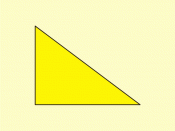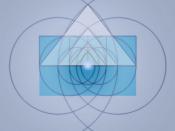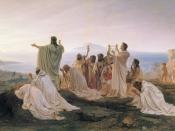PYTHAGORAS - The man behind the numbers
The Pythagoreans' special numbers
1
The number one was very special to the Pythagoreans. It was the first number to be created, and they considered it much more than a number. They thought of this number as if it was created in the image of God. This number had divine qualities; it was a symbol of unity, wholeness and priority.
2
Two was the first of the even numbers, which were considered as the 'male numbers'. This was a special number too, but it didn't have as many divine qualities as number one.
Teatraktos
The fact that the sum of the four first numbers is ten (1+2+3+4) meant something special to the Pythagoreans. In Greek they called this sum teatraktos, and this was one of the innermost secrets of the group.
Perfect numbers
They also operated with perfect numbers. A perfect number is a number whose factors sum up to the number itself.
(6: 1+2+3) Between one and 10,000 there are only four of these; 6, 28, 496 and 8128. The Pythagoreans compared this to humans: very few are perfect, good and beautiful. But imperfection in numbers is common, just like evil and ugliness in people.
The Golden Ratio
a/b= 1.618
If you divide the longest side of a square with the short side of the square and get 1.618 the square has a Golden Ratio. Here is an example:
If you divide 3.2 cm with 2.0 cm you get 1.618. Therefore the square is considered as a pretty one.
Most people find things with a golden ratio beautiful. If you divide your height with the height from your feet to your bellybutton and get 1.618, you're "perfect". The golden ratio also exists in snails houses and in other different...



Very well done
This is very well done and provides a lot of important information about pythagoras and the pythagorians. Anyone needing information should read this piece.
2 out of 3 people found this comment useful.